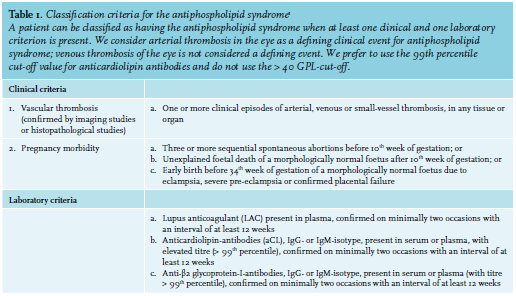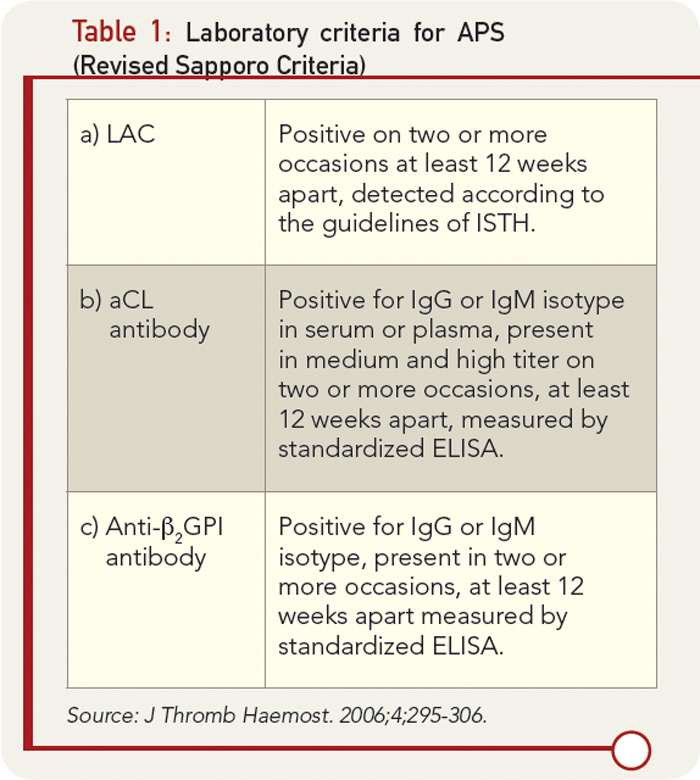Antiphospholipid Antibody Testing Which Are Most Useful for Diagnosis
Which are most useful for diagnosis. Despite an active international effort to improve diagnosis and treatment of the antiphospholipid syndrome Hughes syndrome there remain problems of lack of standardization and lack of prospective and multivariate epidemiologic analysis which restrict the diagnostic and predictive ability of comme.

The Catastrophic Antiphospholipid Syndrome Caps Resources And Notes Tom Wade Md
Progress has been made on the standardization of tests as.

. Currently lupus anticoagulant LAC anticardiolipin aCL and antibeta2-glycoprotein I antibodies aβ2GPI IgG or IgM are included as laboratory criteria if persistently present. Clin Appl Thromb Hemost 200174241-58. Laboratory diagnosis of APS relies on the demonstration of a positive test for aPL.
In clinical practice the gold standard tests are those that detect. Laboratory diagnosis of APS relies on the demonstration of a positive test for aPL. Currently lupus anticoagulant LAC anticardiolipin aCL and antibeta2glycoprotein I antibodies aβ2GPI IgG or IgM are included as laboratory criteria if persistently present.
In clinical practice the gold standard tests are those that detect beta2GPI-dependent aCL or LA. Laboratory diagnosis of APS relies on the demonstration of a positive test for aPL. The question on the use of anti-beta2GPI asa routine.
Progress has been made on the standardization of tests as guidelines on. The question on the use of anti-beta2GPI asa routine diagnostic test remains unanswered and testing for these antibodies should be only performed in very selected cases and not as an. Currently lupus anticoagulant LAC anticardiolipin aCL and antibeta2glycoprotein I antibodies aβ2GPI IgG or IgM are included as laboratory criteria if persistently present.
Three test groups used together are recommended for antiphospholipid syndrome APS diagnosis. Although not being used to diagnose the syndrome strictly speaking testing for a LA can be useful when evaluating asymptomatic individuals who have an unexplained prolonged aPTT identified during the course of routine. Which lab tests are most useful for diagnosing antiphospholipid syndrome.
These aPL are heterogeneous in nature. Bertolaccini ML Hughes GR. Rheum Dis Clin North Am 2006323455-63.
The diagnosis of antiphospholipid syndrome APS relies on the detection of circulating antiphospholipid antibodies aPL. The diagnosis of antiphospholipid syndrome APS relies on the detection of antiphospholipid antibodies aPL. Which antiphospholipid antibody tests are most useful.
Antiphospholipid syndrome APS is characterized by thrombosis andor pregnancy complications in the presence of persistent antiphospholipid antibodies APLA. Antiphospholipid antibody testing is used to help determine the cause of. The antiphospholipid antibody syndrome APS is an autoimmune condition characterised by a wide range of clinical features but primarily identified as thrombotic andor obstetric related adverse events.
Progress has been made on the standardization of tests as guidelines on. Has a higher specificity for the diagnosis of antiphospholipid syndrome both tests should usually be performed at the same time. The question on the use of anti-beta2GPI asa routine diagnostic test remains unanswered and testing for these antibodies should be only performed in very selected cases and not as an alternative.
13 Biggioggero M Meroni PL. Laboratory Diagnosis of Antiphospholipid Syndromes. Antiphospholipid syndrome APS may be diagnosed when arterial or venous thrombosis or recurrent miscarriage occurs in a subject in whom laboratory tests.
Currently lupus anticoagulant LA anticardiolipin aCL and antibeta2-glycoprotein I antibodies aβ2GPI IgG or IgM are included as laboratory criteria if persistently present. However there remains a need for diagnostic criteria for routine clinical use. Blood tests for antiphospholipid antibodies There are three main blood tests used to diagnose APS and they are all looking for antiphospholipid antibodies aPL.
The updated international consensus criteria for definite antiphospholipid syndrome APS are useful for scientific clinical studies. Many consider the current standard tests for ACA. Maria Laura Bertolaccini Graham R V Hughes چکیده.
Screening is done using a reagent with low phospholipid levels. The geoepidemiology of the antiphospholipid. Currently lupus anticoagulant LAC anticardiolipin aCL and antibeta2-glycoprotein I antibodies aβ2GPI IgG or IgM are included as laboratory criteria if persistently present.
Anticardiolipin antibodies aCL Lupus anticoagulant LA Anti-beta2-glycoprotein-1 anti-B2GP1. Which are most useful for diagnosis. If an antiphospholipid antibody is detected the same tests should be requested 12 to 24 weeks later to determine whether their presence is persistent or.
The diagnosis of antiphospholipid syndrome APS relies on the detection of circulating antiphospholipid antibodies aPL. The testing of antibodies to the possible targets of APAs such as β 2-GpI and phosphatidylserine is currently under debate. In clinical practice the gold standard tests are those that detect beta2GPI-dependent aCL or LA.
APS is associated with the presence of antiphospholipid antibodies aPL including the so-called lupus anticoagulant LA. Laboratory diagnosis of APS relies on the demonstration of a positive test for aPL. The laboratory investigations are designed to detect elevated levels of pathologically relevant autoantibodies which are generically described as antiphospholipid aPL autoantibodies aAbs.
APLS is tested in the laboratory by using both liquid-phase LAC tests and the solid-phase ELISA assays ACAs and other antibody assays. We audited the results of routine antiphospholipid antibodies aPLs in a cohort of 193 consecutive patients with aPL positivity-based. LAC measurement remains a complicated procedure with many pitfalls.
Lupus Anticoagulant Testing Analytical Considerations and Reporting Testing of PT aPTT and thrombin time TT to exclude undiagnosed coagulopathy or anticoagulant therapy should ideally precede LAC testing. Progress has been made on the standardization of tests as. The anticardiolipin antibody aCL assay based on bovine cardiolipin as the test phospholipid is the main assay used to detect APAs and has been widely adopted by.
They include lupus anticoagulant LA anticardiolipin aCL antibodies immunoglobulin G IgG and IgM and anti-beta-2 glycoprotein 1 anti-β 2 GP1 antibodies IgG andor IgM. The antiphospholipid syndrome Hughes syndrome is a blood clotting disorder characterized by sporadic unpredictable and sometimes life-threatening. The diagnosis of antiphospholipid syndrome APS relies on the detection of circulating antiphospholipid antibodies aPL.
Individuals in whom testing for antiphospholipid antibodies is unlikely to be helpful include elderly patients with venous or arterial thromboembolism. The diagnosis of antiphospholipid syndrome APS relies on the detection of circulating antiphospholipid antibodies aPL. DRVVT and SCT are done in three steps-screening confirmation and mixing study.
1 The accurate laboratory testing for APS carries significant implications for individuals who have suffered from one of the core clinical manifestations. In clinical practice the gold standard tests are those that detect beta2GPI-dependent aCL or LA. Laboratory diagnosis of APLA depends upon the detection of a lupus anticoagulant which prolongs phospholipid-dependent anticoagulation tests andor anticardiolipin aCL and anti-β 2 -glycoprotein-1 β2GPI.

Article Diagnosing And Treating Antiphospholipid Syndrome A Consensus Paper Full Text April 2019 Njm

Antiphospholipid Antibody Testing Update The Rheumatologist

Indications For Antiphospholipid Antibodies Testing Download Scientific Diagram
No comments for "Antiphospholipid Antibody Testing Which Are Most Useful for Diagnosis"
Post a Comment